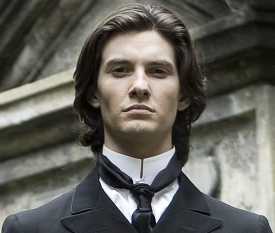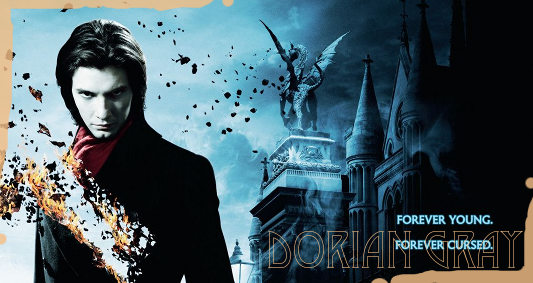Post by Dorian Gray on Nov 22, 2010 11:58:58 GMT -5
Gray, Dorian[/i]
"We Are But the Players"
Name: Dorian Gray
Age: Unclear, but assumed about 35. (His is, ultimately, ageless.)
Story: The Picture of Dorian Gray (1890) by Oscar Wilde
Affiliation: Beauty (While he is the hero of his story, ‘Neutral’ may best describe him.)
Occupation: Dilettante
"Beauty is in the Eye of the Beholder"
Hair: Dark Brown
Eyes: Dark Brown
Height: 6’1”
Weight: 80kg
General Build: Dorian’s build is the build of an orphan who has inherited well. It is slighter of frame from a life of leisure and yet, properly filled out from good care and healthy diet.
Play-by: Ben Barnes
"All of it is Elementry"
Personality: Dorian is a complex mix of cynicism and desperate optimism. While he views the world as an essentially dark place, the darkest of this place being visited on his soul, he is also made alive by its beauty. He delights in true wonders, particularly of the female variety, and can only take joy in an inspired vision of loveliness.
He is a jovial and vain dandy, when given over to his vices and the influence of Lord Henry Wotton, but suffers from fits of melancholy and total despair when he is faced with the depravity of what he has become. He is repulsed by the ugly, particularly that which resides on his fateful canvass. It is rare to coax honesty out of him and one is more likely to coincide with his flirtatious alter-ego.
However, delving too deep will reveal Gray’s deep-seated anger and may lead to someone far more murderous.
Weapons:
- A sword, disguised by a walking stick.
Skills: So long as the picture is intact Dorian does not age nor can any injury affect him - instead all infirmities are passed on to it. Also, his ageless nature and his upbringing has enabled him to pick up a few skills.
- Fencing
- French and Latin
Mother: Margaret Devereux - the beautiful daughter of Lord Kelso, who upset her father and caused a scandal by eloping with a poor man of a lower class. She died a few months after her husband was killed by a man working for her father.
Father: Unnamed - a penniless foot-soldier who perished in a fight after his father-in-law sent a man to insult him.
Siblings: None.
Other Family: Lord Kelso – Dorian’s wealthy maternal grandfather. After the death of Dorian's mother, Lord Kelso took Dorian into his home even though he despises the boy because he reminds him of his daughter and her marriage to a no-account soldier.
Other Acquaintances:
Lord Henry ‘Harry’ Wotton – the source of Dorian’s hedonistic values and his encourager in every way.
Sybil Vane (Deceased) – possibly Dorian’s only true love, but the affair ended as Dorian believed that her failing acting talent ‘killed’ his love for her. She later poisoned herself, marking Dorian’s descent into debauchery.
Basil Hallward (Deceased) – the artist that rendered Dorian’s painting and the one that Dorian murdered in his anger at what he had become.
History: Dorian Gray was born to Margaret Devereux and her husband, a poor foot-soldier. After a disagreement with her father went poorly, Dorian lost his father to a fight and, shortly afterwards, his mother to the grief. An orphaned boy who is the heir to a great fortune, he is taken in by his grandfather, Lord Kelso. His relationship with the man is tense as he reminds him of his daughter and the penniless nothing for whom she degraded herself.
Dorian was awarded the leisure of aristocratic upbringing and was schooled in foreign languages and fencing. He was an innocent youth, full of inspiration for the future and easily influenced. After meeting the artist Basil Hallward at a society event, he is requisitioned for a portrait. (The artist, seemingly enthralled by his young muse.)
After Hallward painted the portrait, it was seen by Lord Henry Wotton, who immediately became obsessed with the idea of moulding the impressionable-looking young man according to his skewed moral views. He was resolved to involve himself in Dorian’s life. Meeting Lord Wotton, Dorian was immediately transfixed by the man. After he saw the painting, he declared that he would give his soul if he was always to be young and the painting instead grew old.
By some unknown magic, it came to be. He began to live his life under the tutelage of Lord Wotton.
On an outing to a nearby theatre, Dorian found himself infatuated with an actress in the company, Sibyl Vane. He proposed marriage and, through introducing her to true love over the love of theatre, destroyed her abilities. Through a single bad performance he claimed that she had ‘killed’ his love. (Indoctrinated as he is by Lord Wotton into believing that only beauty binds.) He left her. They cruelty of his act, caused the young girl to poison herself. This caused an unusual discrepancy in his portrait, which developed a sneer of disdain. When informed by Lord Wotton of the event of Sybil’s death, the corruption of his soul became apparent as he remained unaffected by her death.
So began the era of the boy’s descent into low society in London while still giving dinners and musicals for high society. He was inspired by two things: the book Lord Henry sent him that seemed to predict his own life in dissecting every virtue and every sin from the past; and secondly the picture of himself which grew steadily older and more vicious looking compared to his own mirror image which remained young. His vanity grew to be unparalleled.
Fanatical about the portrait, he was driven to murder and deception, finally destroying the artist that captured his likeness to begin with. Now, ashamed of what he has done and, yet, to prideful to return to true virtue, he is caught in a spiral of continuing hedonism tempered by his guilt and the looming condemnation of a hideous likeness hidden in his home.
"But All the World is a Stage"
Name: Lauren
Years Roleplaying: 6 years.
How did you find us?: It’s me, Mary! ☺
RP Example:
The George Inn was not exactly the type of venue that Amelia Lentz frequented of her own accord. There were soldiers everywhere it seemed, falling out of nooks and crannies with a heavy smell of what she had been assured was London’s very finest ale. Thomas had been so busy with the raids for the last fortnight that they had not seen each other at all and Amelia missed him intently. She had not known how much until she had found herself agreeing, via telegram, to meet him at this Southwark Inn. She turned to look at the door for what seemed the millionth time, seeing no one in the uniformed throng that even vaguely resembled her brother. She was tiring of this quickly.
She reached into her emerald green jacket pocket to retrieve her cigarette case and holder, her black gloves making it a little difficult to release the clasp. She pulled one of the cigarettes from its place and inserted it into the tortoise-shell holder, eagerly anticipating the release she usually got from smoking. Replacing her case, she searched for her lighter and then gently inhaled the smoke. An ashtray appeared before her as if from nowhere. She assumed it was the barkeep. She pulled out her gold, filigreed pocket-watch and checked the time. It was forty-five minutes past six o’clock and forty-five minutes past their scheduled rendezvous. She would have left already if she had not been so anxious to see him. Anxiety of a different sort now began to creep up on her. Where was he?
She looked around the room and took in more of her surroundings. The décor was warm, if anything, and Amelia urged herself to admit that it was not that bad. It had all the comforts one really needed. She noted a violin strapped to the wall as a part of the adornments, settled in amongst two painted country scenes and an early black and white print of Mae West, which seemed oddly out of place. Although, she had to admit, that the crowd the Inn drew made Mae a little more in keeping with the tempo than scenes of Innocence in Good Ol’ England. The violin itself looked old, but not the sort of old that maintained attention for too long. While it was entirely possible to find treasure amongst inherited possessions, this instrument was no forgotten gemstone. It was made of spruce wood, however, one of the staples for any carver, and she imagined that, if properly tuned, it might sound half-decent. She checked her watch again. Fifty-five minutes past six. She made a note to kill Thomas when he finally arrived.
A drunken version of ‘Rule Britannia!’ rang out from the back corner of the inn and Amelia was somewhat concerned and also somewhat impressed that the level of sobriety was so decreased at such an early hour. The rowdy slurring was followed by the distinctive crash of glasses to the floor as someone tripped over something and took a dive toward the floor. The barkeep yelled his disapproval.
Then, Amelia felt it.
It was that most horrible of all feelings to come over one at an overcrowded pub. It was that tension in every part of her body that came with the tightness of discomfort in her chest. Someone was watching her; she could feel it. From the beer-halls of Germany to the popular George Inn of Southwark, that feeling was always the same. She adjusted her pristinely styled hair self-consciously even though not a strand was out of place. The feeling remained and she knew that any minute, it would have a face and that face would appear in a slightly drunken stupor of confidence and make her a proposition. She leaned her head in her hand as she rested her elbow on the bar, resigned. Germans, Frenchmen, Englishmen, they were more similar than they realised. She was suddenly grateful she was not in Italy. This situation was always worse in Italy.
Suddenly, there was another elbow on the bar, leaning in towards her and an unfamiliar face about to speak.
[/blockquote]

